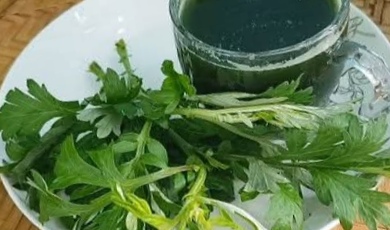Ingredients
1. What is Wormwood?
Wormwood is a perennial herb native to Europe, Asia, and North Africa but now cultivated worldwide. Its silvery-green leaves and yellow flowers are rich in bioactive compounds, most notably thujone, flavonoids, and absinthin. Historically, wormwood was a key ingredient in absinthe and other herbal tonics, valued for its medicinal and digestive properties.
2. Top Health Benefits of Wormwood
a. Supports Gut Health
Wormwood is famous for its ability to promote a healthy digestive system. Its bitter compounds stimulate the production of bile and digestive enzymes, helping to break down food more effectively. Additionally, wormwood’s antimicrobial properties can help combat harmful bacteria and parasites in the gut, improving overall gut flora balance.
b. Reduces Sugar Cravings
One lesser-known benefit of wormwood is its ability to help regulate sugar cravings. The bitter taste of wormwood can signal the brain to reduce sugar dependency, making it a natural aid for those looking to cut back on sweets.
c. Fights Inflammation
Wormwood contains potent antioxidants like flavonoids and sesquiterpene lactones that combat oxidative stress and reduce inflammation. This makes it beneficial for managing conditions like arthritis or other inflammatory disorders.
d. Natural Antimicrobial and Antiparasitic
Traditional medicine has long used wormwood to treat parasitic infections. Modern studies confirm its effectiveness against various parasites, including those responsible for malaria. Its antimicrobial properties also make it useful for fighting infections.
3. How to Use Wormwood
Wormwood is available in various forms, including:
- Teas and Tinctures: Popular for digestive support and general health.
- Capsules: Convenient for precise dosages.
- Essential Oils: Used externally for its antimicrobial properties (not for ingestion).
Dosage Tip: Due to its potency, wormwood should be used in moderation and under the guidance of a healthcare professional. High doses of thujone, a compound in wormwood, can be toxic.
4. Precautions and Side Effects
While wormwood offers impressive benefits, it’s essential to be cautious:
- Avoid During Pregnancy: Wormwood may stimulate uterine contractions.
- Allergic Reactions: Some individuals may experience skin irritation or allergic reactions.
- Interaction with Medications: Consult your doctor before use if you’re taking medications.
5. Why Wormwood is Worth a Try
With its rich history and growing body of scientific support, wormwood is proving to be a valuable addition to natural health remedies. Whether you’re looking to enhance digestion, combat inflammation, or kick sugar cravings, this bitter herb has much to offer.
Final Thoughts
Wormwood (Artemisia absinthium) is more than just an ancient herbal remedy—it’s a powerful ally for modern health challenges. By incorporating wormwood into your wellness routine responsibly, you can unlock its potential to support a healthier, happier you.
